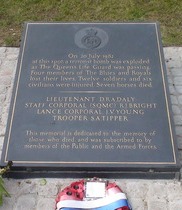Four soldiers were killed by an IRA bomb at Hyde Park in central London on 20 July 1982.
Corporal Roy John Bright, 36, Lieutenant Denis Richard Anthony Daly, 23, Lance Corporal Jeffrey Vernon Young, 19, and Simon Andrew Tipper, 19, were all members of the Royal Household Cavalry, Blues and Royals.
They were riding from their barracks to Buckingham Palace when a nail bomb in a car detonated in South Carriage Drive at around 10.43am.
The explosion also killed seven horses and caused serious injuries to other soldiers, police officers and civilians.
Two hours later a second bomb hidden underneath the bandstand in Regent’s Park exploded during a performance of the music from Oliver! by the Royal Green Jackets band in front of a crowd of 120 people. Seven military bandsmen were killed.
The Provisional Irish Republican Army (IRA) claimed responsibility for the attacks.
In 1987 Gilbert McNamee was sentenced to 25 years for conspiracy to cause explosions including the Hyde Park attack but in 1998 his conviction was quashed on the grounds it was ‘unsafe’.
On 22 May 2013 the Metropolitan Police Service Counter Terrorism Command charged John Anthony Downey, 61 [19/1/52] of County Donegal, Eire, with murder and causing an explosion likely to endanger life relating to the Hyde Park bomb.
Downey was due to stand trial in January 2014 but the indictment was stayed on 21 February 2014 after his legal team argued the prosecution was an abuse of process.
He had been sent a ‘letter of assurance’ by the Northern Ireland Office on 20 July 2007 – the 25th anniversary of the attacks – wrongly stating that he was not wanted by any UK police force.
In fact he was listed as wanted by the Metropolitan Police for conspiracy to murder in relation to the Hyde Park bombing. The Police Service of Northern Ireland has accepted blame for the error.
Mr Justice Sweeney said in his ruling that the public interest in prosecuting Downey was outweighed by the ‘public interest in holding officials of the state to promises they have made in full understanding of what is involved in the bargain.’
The decision was reported on 25 February 2014 after the prosecution announced they would not seek to appeal.
